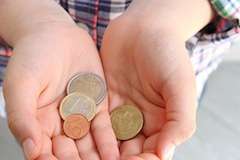Why are some children more giving than others?

Parents and educators are acutely aware that children can be both excessively self-oriented and overwhelmingly generous. For every preschooler refusing to share his toy truck, there's an 8-year-old who insists on giving all of his allowance money to the homeless. Kids can also enjoy their altruism. One study found that even two-year-olds were happier giving something away than receiving a gift.
But research also finds that this natural generosity can be stunted by environmental factors—and one of them, it seems, is wealth. Across a range of studies, college students and adults from affluent backgrounds have shown less social attention and generosity with money than their poorer counterparts. The repercussions of this dynamic go beyond an obvious rise in the disparity between rich and poor. Traits like empathy, generosity, and compassion also have a positive influence on individual health and happiness.
So when does a family's socioeconomic status begin to influence a child's prosocial behavior—and how might that affect health? To answer these questions, Jonas Miller and his UC Davis colleagues gave 74 preschool-age children a "donation" challenge. Over a series of tasks, the children earned tokens that they knew could be exchanged for prizes.
They were then given the choice of donating none, some, or all of their tokens to anonymous sick children, who were unable to come and earn prizes for themselves. The children were left alone to decide whether to transfer any of tokens from their box to one reserved for their sick counterparts. The researchers also gathered information on each child's family income (which ranged from $15,000 to more than $150,000).
Miller's team also used a device called an EEG to measure activity in the children's parasympathetic nervous systems throughout their task. The parasympathetic nervous system (PNS) helps us keep our cool in threatening situations. Healthy PNS functioning is linked to many positive health outcomes. Children from economically disadvantaged backgrounds are often found to have less-regulated PNS functioning.
Given what we know about adults, the results of the study were not surprising. Children from less wealthy families gave away more of their tokens than those from wealthier ones. Generous children, rich and poor, exhibited healthier PNS functioning throughout the various phases of the task. The PNS functioning of altruistic children indicated that they perceived the option to donate as safe, and they responded to it calmly. These children also demonstrated a mobilizing of physiological resources that indicate healthy engagement; their physiological patterns set the stage for positive, pro-social behavior.
Interestingly, once the task was completed, both children who gave more and children from wealthier backgrounds showed the healthiest levels of arousal. So the act of giving may offset the phenomenon of children from poorer homes showing less regulation in their arousal systems.
The takeaway: Material wealth may indeed have small, but powerful, effects on our children's desire to give to others. Furthermore, whether we see it or not, our children might be internalizing family wealth.
This study gives us much to consider in our schools—and at our dinner tables.
Giving may well provide children with a powerful buffer against the negative physiological affects of poverty. This research empowers those of us raising or working with children who have less family wealth to foster and encourage generosity. Luckily, many people believe that we can teach altruism to children of any background by setting positive examples and structuring their environment. So whether your work begins with establishing a safer, more connected classroom, or with creating a daily meditation practice with your child, it's not just good for our world. It's also good for our kids.


















